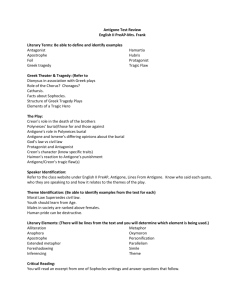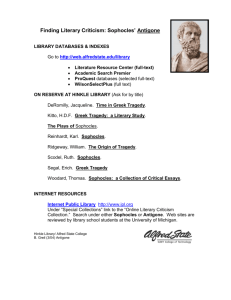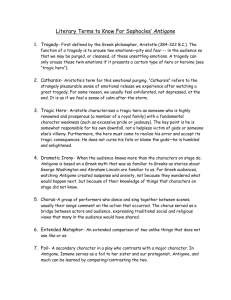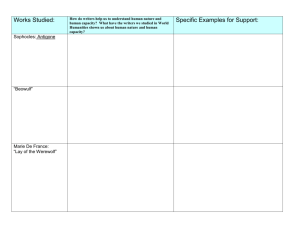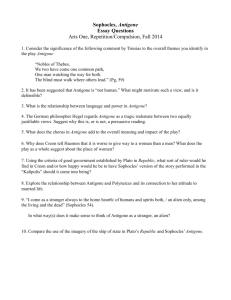Materials Needed: Sophocles: The Complete Greek Tragedies
advertisement
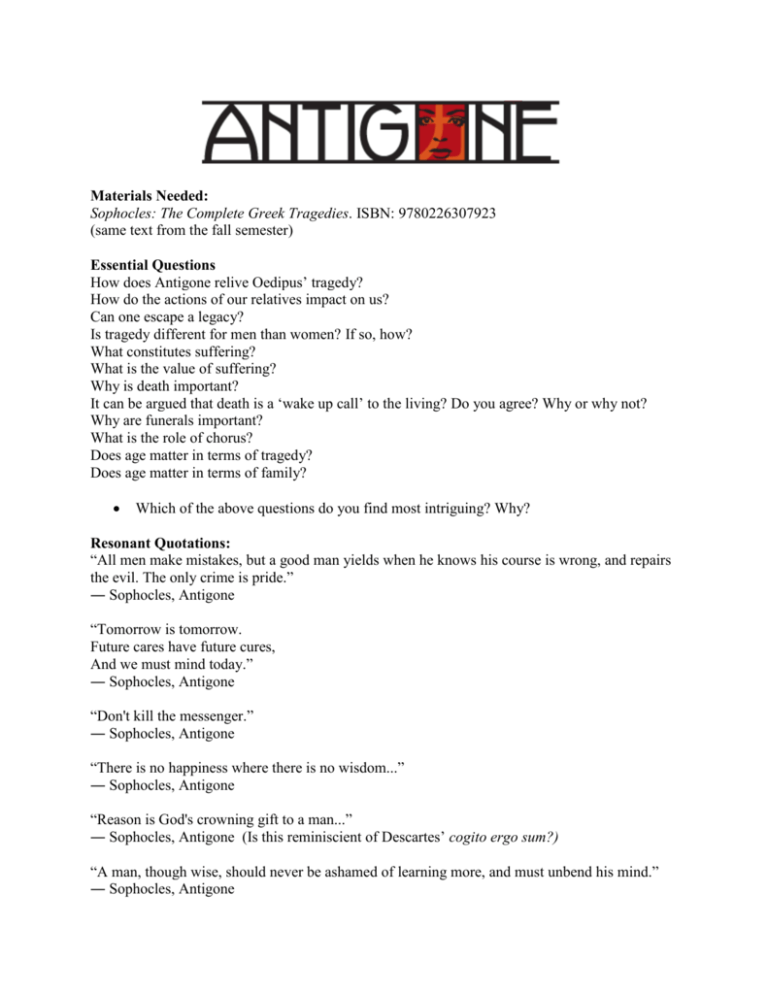
Materials Needed: Sophocles: The Complete Greek Tragedies. ISBN: 9780226307923 (same text from the fall semester) Essential Questions How does Antigone relive Oedipus’ tragedy? How do the actions of our relatives impact on us? Can one escape a legacy? Is tragedy different for men than women? If so, how? What constitutes suffering? What is the value of suffering? Why is death important? It can be argued that death is a ‘wake up call’ to the living? Do you agree? Why or why not? Why are funerals important? What is the role of chorus? Does age matter in terms of tragedy? Does age matter in terms of family? Which of the above questions do you find most intriguing? Why? Resonant Quotations: “All men make mistakes, but a good man yields when he knows his course is wrong, and repairs the evil. The only crime is pride.” ― Sophocles, Antigone “Tomorrow is tomorrow. Future cares have future cures, And we must mind today.” ― Sophocles, Antigone “Don't kill the messenger.” ― Sophocles, Antigone “There is no happiness where there is no wisdom...” ― Sophocles, Antigone “Reason is God's crowning gift to a man...” ― Sophocles, Antigone (Is this reminiscient of Descartes’ cogito ergo sum?) “A man, though wise, should never be ashamed of learning more, and must unbend his mind.” ― Sophocles, Antigone Quick Synopsis: The third of Sophocles' Theban plays chronologically and the first written, Antigone is his second greatest world literature contribution, second only to Oedipus the King itself. Like that work, its greatness has reigned for nearly 2,500 years, and it is still a model of what tragedy should be; deftly plotted and perfectly executed, it has a sympathetic protagonist, a crushing climax, sublime poetry, and a wealth of meaningful themes. Though less famous than Oedipus the King and not quite as great, it is so tantalizingly close that it remains an immortal masterpiece. It is essential for everyone. As in Oedipus the King, the title character may be the aspect that has always spoken most strongly. Though not a tragic hero in Oedipus' strict sense, Antigone has fundamentally human thoughts and feelings that make her supremely relatable; we feel with and for her because we see ourselves in her. She may be extremely high strung, and her actions and emotions may be highly wrought, but she is an extreme case of what the dark, often contradictory emotions at humanity's heart can lead to if followed to the logical conclusion. Whatever her faults, she is far more sinned against than sinning, and the depiction of her doomed love and tragic end are profoundly moving; few portrayals are more pathos-drenched. However ostensibly different from us, she has the indisputable human core necessary for a truly moving character. Whether or not we agree with her, we sympathize strongly, and her determination and resilience are truly admirable. We must not overlook the significance of a female protagonist in an ancient Greek work. Greek society was truly a man's world; women were oppressed to an extent that has long been unthinkable in the Western world. They were not considered unequal so much as hardly thought of at all; indeed, they seem not to have been allowed at dramatic performances - a true irony here. Antigone has thus unsurprisingly been the focus of much feminist criticism. Calling it proto-feminist would be too much, but having a female protagonist - much less a sympathetic one - was indeed notable. Though lacking Greek male heroes' attributes, she is a far cry from the wily but essentially frivolous goddesses and women in Homer and elsewhere, to say nothing of helpless damsels like Helen. The play vividly showed that, however insignificant women were, their wishes could not simply be ignored - and that tragic consequences may result if they are. It was not until far later - perhaps the mid or late Victorian era - that literature had another heroine of comparable strength. Yet she is not the only interesting character; indeed, strictly speaking, Creon is the true tragic hero. Much like Oedipus, he has tragic flaws - arrogance, narrow-mindedness, impulsiveness that lead to his downfall. It is hard not to hate him at first, especially considering the story's background, but at least as hard not to be moved by the truly pathetic picture of the broken man he is at the end. He may have deserved punishment, but few would say he deserved the catastrophe he got, which is one of the most vivid and deeply stirring illustrations of how a rash act done quickly with little thought can lead to fatal conclusions. As important as Antigone is to the play's core emotion and thought-provoking aspect, Creon is also essential. The story itself is key as well. The original audience knew the background well, and it has continued to be so famous that most will know a lot before reading, but Sophocles portrays it with such skillful mastery that it affected Athenians with mesmerizing power and continues to do so. Only Oedipus the King even rivals it for plot tightness and perfect execution; no one has ever made better use of foreshadowing or dramatic irony, and the breathtaking climaxes have rarely even been approached. The story is put together with almost mathematical precision, and the close is simply devastating. The totality of bitterly ironic events is so crushingly malevolent that it shows the absolute worst that can happen to people. For this reason among many others, the play remains a consummate tragedy. The work's lasting value may be due primarily to its extraordinary dramatization of numerous weighty themes. All Greek tragedies were broadly philosophical in a way later plays - to say nothing of current ones - rarely are, but this is a prime example. Women's issues aside, it deals with important subjects like family relations, questions of political succession, private vs. public loyalty, pride vs. humility, etc. That Sophocles was able to do all this in a work of less than fifteen hundred lines - about one third of Hamlet - is a testament both to his genius and to ancient Greek art's essential concision. - Bill Moore Grammar: We are going to continue our focus on trying to arrive at more complicated sentence structures and elevated tone. Throughout Antigone, consider what cohesive and interesting sentence syntax does to an essay. Essay Paper: Choose one of the following topics for your essay: Explain the importance of appearance versus reality. Explore the theme of suffering and explain its effect on a character or characters. Explain the impact of suffering through Antigone the character Explain the role of the secondary characters such as Creon and Ismene . Create your own topic on the theme of family, friendship, enemies, or some other idea that interests you (your thesis must be approved by me). As always, topics beyond those listed can certainly be a possibility. Due Date: TBD Requirements: Four outside sources Paper must be 5 –6 pages Grammatical and syntactical errors will be strongly penalized. An ‘A’ paper will have less than 5 errors. If you need an additional copy of the rubric previously distributed during our fall semester, please let me know.


